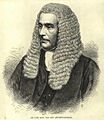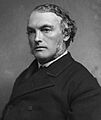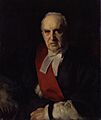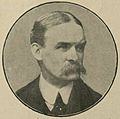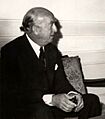Attorney General for England and Wales facts for kids
Quick facts for kids United KingdomAttorney General for England and Wales |
|
|---|---|
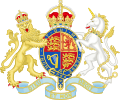
Royal Arms of His Majesty's Government
|
|
| Attorney General's Office | |
| Style | Attorney General (informal) The Right Honourable (within the UK and Commonwealth) |
| Member of |
|
| Reports to | Prime Minister of the United Kingdom Secretary of State for Justice |
| Nominator | Prime Minister |
| Appointer | The Monarch
(on the advice of the Prime Minister)
|
| Term length | At His Majesty's pleasure |
| Formation | 1277 |
| First holder | William de Boneville |
| Deputy | Solicitor General for England and Wales |
| Salary | £178,594 per annum (2022) (including £84,144 MP salary) |
The Attorney General for England and Wales is a very important legal adviser to the King and the UK Government. This person is the top legal officer for England and Wales. They lead the Attorney General's Office and often attend meetings with the Cabinet, which is the main group of senior government ministers.
Unlike in some other countries, the Attorney General doesn't manage all justice matters. That job is handled by the Secretary of State for Justice and the Lord Chancellor. The person holding this role is also the Advocate General for Northern Ireland.
The job of Attorney General has been around for a long time, since at least 1243. Back then, a lawyer was hired to represent the King in court. Over time, the role became more political. By the 1670s, the Attorney General officially became the Crown's main legal helper. In the 1900s, the role changed from mainly dealing with court cases to giving legal advice to the government.
Today, the Attorney General oversees important legal groups like the Crown Prosecution Service (which handles most criminal cases) and the Government Legal Department (which gives legal advice to government departments).
Contents
What Does the Attorney General Do?
The Attorney General has several key responsibilities. They advise the government, different government departments, and individual ministers on legal issues. They also answer legal questions in Parliament.
- Overseeing Legal Bodies: The Attorney General supervises the Serious Fraud Office, which investigates serious fraud and corruption. They also oversee HM Crown Prosecution Service Inspectorate and the Service Prosecuting Authority.
- Legal Advice: They give legal advice to the government on what they can and cannot do legally. This advice can be given in meetings or in writing.
- Court Cases: While most court cases are handled by other legal teams, the Attorney General still represents the government in some very important cases. They also choose the lawyers, called Treasury Counsel, who handle most government legal cases.
- Appeals: They can ask the Court of Appeal of England and Wales to review sentences that seem too light or to clarify legal points.
- Stopping Prosecutions: In rare cases, they can issue a nolle prosequi, which means stopping a criminal prosecution.
- Delegating Duties: The Attorney General can ask the Solicitor General for England and Wales to take on some of their duties. When the Solicitor General acts, it's as if the Attorney General themselves made the decision.
A Brief History of the Role
The exact start of the Attorney General's job isn't fully known, but records show it existed in 1243. Back then, the person in this role mostly represented the King in court cases and didn't have a political role. It was a demanding job, even if it paid well!
In 1461, the job became more political when the Attorney General was asked to advise the government in the House of Lords. This was also the first time the title "Attorney General" was used.
During the 16th century, the Attorney General helped pass messages between the House of Lords and the House of Commons. By 1673, the Attorney General officially became the Crown's legal representative. Since then, it's been common for the Attorney General to be a member of either the House of Commons or the House of Lords.
Around 1890, the Attorney General stopped being allowed to work privately as a lawyer. This made the job a full-time role for the government. Since the early 1900s, the role has become more about giving legal advice to the government and less about directly handling court cases.
The Attorney General and the Cabinet
The Attorney General is not usually a full member of the Cabinet, but they are invited to attend Cabinet meetings. This is a tradition, not a strict law. The idea is to keep the Attorney General's legal advice separate from political decisions. However, they are a government minister and must answer to Parliament.
They are the chief legal adviser to the King and the government. They advise on the legal consequences of government actions. They also appoint the head of the Crown Prosecution Service, called the Director of Public Prosecutions.
List of Attorneys General (Since 1900)
The role of Attorney General has been held by many important legal figures throughout history. Here are some of the people who have held the position since the 20th century:
- Robert Finlay (1900-1905)
- John Lawson Walton (1905-1908)
- William Robson (1908-1910)
- Rufus Isaacs (1910-1913)
- John Simon (1913-1915)
- Edward Carson (1915)
- F. E. Smith (1915-1919)
- Gordon Hewart (1919-1922)
- Ernest Pollock (1922)
- Douglas Hogg (1922-1924, 1924-1928)
- Patrick Hastings (1924)
- Thomas Inskip (1928-1929, 1932-1936)
- William Jowitt (1929-1932)
- Donald Somervell (1936-1945)
- David Maxwell Fyfe (1945)
- Hartley Shawcross (1945-1951)
- Frank Soskice (1951)
- Lionel Heald (1951-1954)
- Reginald Manningham-Buller (1954-1962)
- John Hobson (1962-1964)
- Elwyn Jones (1964-1970)
- Peter Rawlinson (1970-1974)
- Samuel Silkin (1974-1979)
- Michael Havers (1979-1987)
- Patrick Mayhew (1987-1992)
- Nicholas Lyell (1992-1997)
- John Morris (1997-1999)
- Gareth Williams (1999-2001)
- Peter Goldsmith (2001-2007)
- Patricia Scotland (2007-2010)
- Dominic Grieve (2010-2014)
- Jeremy Wright (2014-2018)
- Geoffrey Cox (2018-2020)
- Suella Braverman (2020-2021, 2021-2022)
- Michael Ellis (2021, 2022)
- Victoria Prentis (2022-2024)
- Richard Hermer (2024-Present)
See Also
- Solicitor General for England and Wales
- Attorney General for Northern Ireland (held by Attorney General for England and Wales from 1972 to 2010)
- Advocate General for Scotland
- Attorney-General for Ireland
Images for kids





